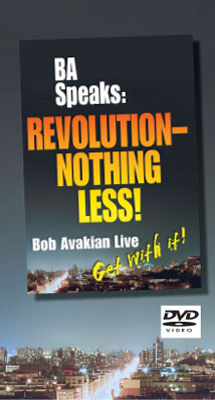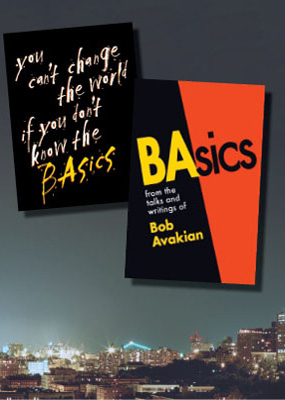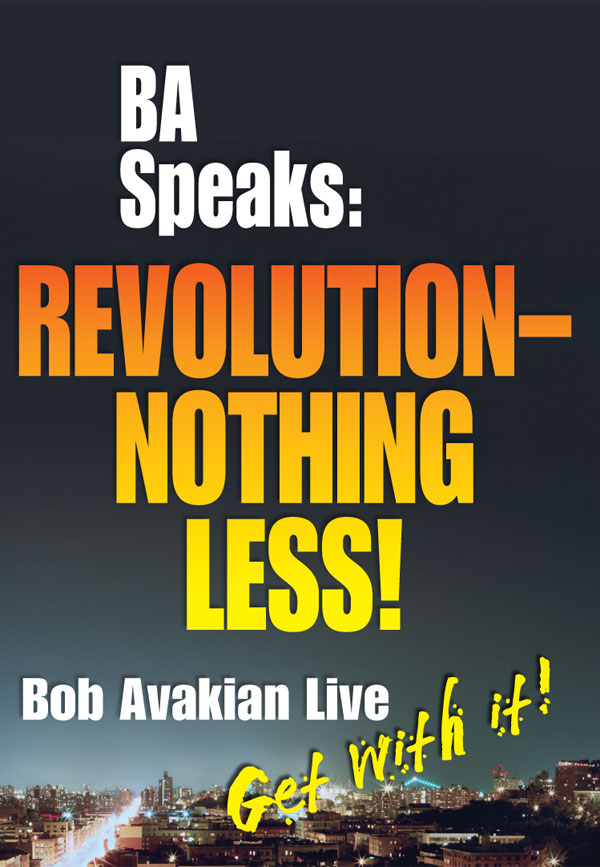From Baton Rouge: Out in the Streets Against Police Murder
“I’ve been thinking about the revolution – I’m part of something bigger than myself.”
July 25, 2016 | Revolution Newspaper | revcom.us
A Revolution newspaper correspondent reporting from Baton Rouge recently interviewed a woman who has been part of the protests that started there right after the police killed Alton Sterling. The protests and her participation have been continuing. The interview also gets into the video she had watched, BA Speaks: REVOLUTION—NOTHING LESS!, a film of a talk by Bob Avakian.
Revolution: What was it like the first few nights after Alton Sterling was murdered?
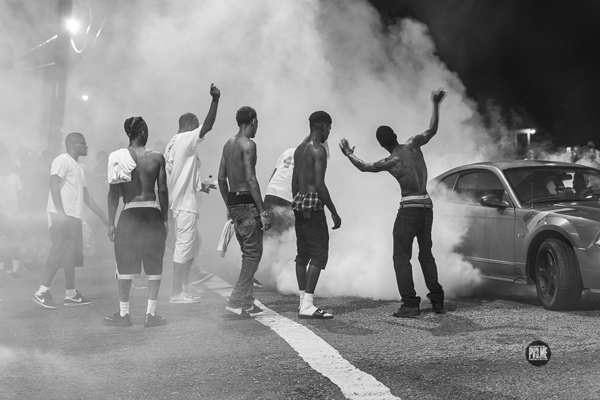
At the Triple S convenience store in Baton Rouge, La. on the night that Alton Sterling was killed by Baton Rouge police. July 5, 2016. Photo courtesy of Mr Don M Green @mrdonmgreen on instagram
A:There were a thousand people out there. Everybody was rattling. It was the first time that I ever saw that many people, Black people, together standing up. It was empowering. I grew up being told Black people couldn’t come together without there being trouble. That we were not capable of doing that. It was mind blowing, freeing. Just to say, it was just... I was in awe. I was impressed. I was proud. I was proud to be a part—it was like—the first time—I’m a proud Black woman but it was the first time I was actually proud—does that make sense?—to be a part of the African-American community. The first time I ever felt like we were together. It was amazing.
Revolution: People pretty much took over the street, didn’t they?
A:Yes, we took over the street, we took over the sidewalk—we took over, one, two, three, four, five—seven blocks. Both sides of a four-lane street crowded with people. It took me 30 minutes to walk from my house to the next block ’cause people were like clustered up together.
And everybody was rallying together, “No justice, no peace.” They were on top of cars and, I don’t know... It was amazing, I can’t really put it into words. Like you almost had to be there to experience the vibe, the pulse. It was like an aura, where people were just... you had a whole group of people all together experiencing the same emotion and on the same vibe. That was amazing.
Revolution: Were there any police out there the first few nights?
A: No.
Revolution: And what were people saying and chanting?
A: “No justice, no peace, no racist police,” “Black lives matter, hands up—don’t shoot,” you know, “Stop police brutality.” They were making references to Trayvon Martin and Michael Brown and all this, mind you, while all this was going on, we had only seen the first video. Only the first video had come out. While we were out there, the second video started to hit everybody’s social media on their phones. So now we’re watching the second video. And the first reaction that I had when I saw the second video, I almost got sick. The first one, I was disturbed, to say the least. The second video—because you only heard the shots on the first video, and we knew what the aftermath was—but the second video, where you saw everything taking place, it was so heavy, I almost couldn’t process it.
Revolution: What was the impact when people started seeing that second video on social media?
A: People’s emotions got harder. People were outraged. They were angry. People were passing their phones around—nobody was worried about anyone taking their phones. People was like, “Did you see this? Did you see this? Did you see this? Can you believe this?” “How could they not put them in jail? How could they... needs to be an investigation!” The second video was—I don’t know, I’m not a crier, but I cried.
Revolution: It’s been over two weeks since the murder of Alton Sterling and nobody knows what’s going on, if anything, with their “investigation.” I don’t get the sense that people are going to let this die down.
A: Ever since the murders of the police in Baton Rouge, you had leaders calling—political people, elected people—calling to not protest. They have put fear in people. Not people like me that are still willing to protest and come out. But they have set fear in the masses. If we are a five-party household and four people are saying, “don’t go out there, the police want to kill you, it’s gonna be bad, they want to hurt somebody”—that’s what happens. People don’t go out. But I, myself personally, I been all over social media calling for people to come out today for 6 o’clock [at the Triple S store where Alton Sterling was killed]. I got a couple of hit-backs, a couple of shares—so weather permitting, we’ll get people back out there and people talking. People are talking, but they are afraid of action. They are afraid of retaliation from the police.
“Here, in Deep South Louisiana, … we were taught not to stand up against the police…”
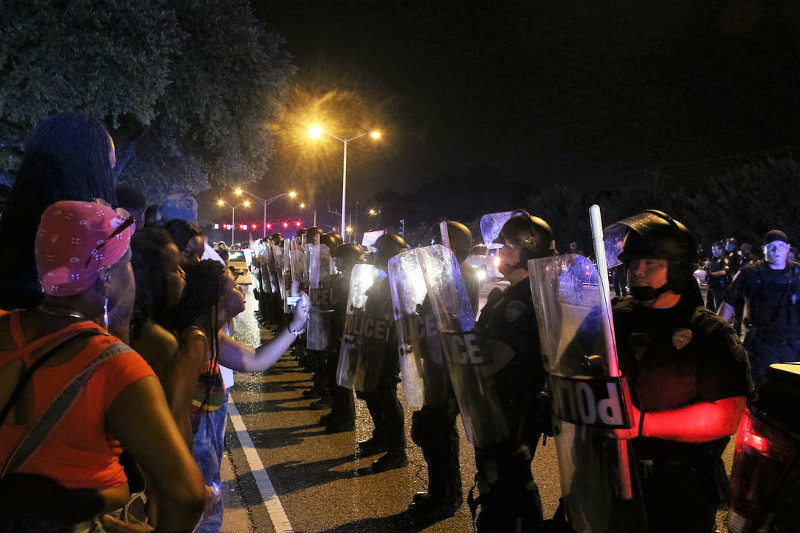
Baton Rouge, July 9, 2016. Protest against the police murder of Alton Sterling. Hundreds of people—overwhelmingly Black youth—grouped and regrouped in their repeated efforts to take over Airline Avenue in the face of a heavy, aggressive, and heavily armed police presence. Over 100 people were arrested before the night was ove, but the people were not cowed or intimidated.
Revolution: You were telling me yesterday that you thought people in Baton Rouge didn’t know how to protest. But it seems that they really stood up in a way that made a big difference across this country and impacted the world.
A: People feel strictly by emotion. We were led by what we hoped to do right. Nobody organized that. There was nobody that called and said let’s go do this. People just came on their own from this neighborhood. They just came out. Some with signs, some without. They didn’t know they was supposed to have signs or not. They didn’t know they was supposed to say something or not. But they was like, “If we can’t do nothing else, we have to stand and let our voices be heard. We have to do something, so let’s all be here. Let’s show them that we are not afraid, that we are not scared.” ’Cause like I said, here, it has been a history of, you know better than to say something about the police—or say something about anything.
Revolution: I’ve met several families whose own children have been murdered by the police. At the march from the Triple S to the church and back, everyone had a story to tell.
A: Here, in Deep South Louisiana, coming up, we were taught not to stand up against the police or other people, you know, but to just pray about it, to be quiet. If you don’t say anything, maybe no more trouble will come. And then, in this area, you have a lot of things that go along with that culture. It’s the way people were brought up, their parents, their grandparents—you know, “Let’s go to church.” We can talk amongst ourselves, but not to anyone else. Because if we do, they’re gonna come back.
We’ve always been taught that the things that happened here last week couldn’t happen here.
Revolution: That protests like those after the murder of Alton Sterling couldn’t happen?
A: Yes, after the murder of Alton Sterling. We were always told that things like that couldn’t happen—that we are not capable of doing that. Northerners, other people were capable of that, but we are not capable. Ever since I can remember, I’ve been told that “you can’t gather up.” If the police see 20 people somewhere standing around, or if they get 100 people at a public park, and they’re all hanging out, playing music, having fun, eating, they come and disperse us. They break that up. This can’t happen, you know? We’re Black people, we’re at a park on our side of town, but they can’t have that. That’s dangerous to have that many Black people together in one spot.
We don’t have organizations here that talk to us about “the empowerment of people, and the betterment of people, and standing up.” We don’t have that. In the South we have “good Southern leaders” who come and calm down the crowd, and tell them to be peaceful, and make a couple of statements on the media. And people watch, and go back to being quiet. We could never speak out for ourselves, other people had to come and speak for us. They couldn’t be from here, from Baton Rouge.
Devastating Effects of Mass Incarceration
Why are we still fighting for justice in 2015?
"Why are we still fighting for justice in 2015?" is a clip from the film REVOLUTION AND RELIGION: The Fight for Emancipation and the Role of Religion; A Dialogue Between CORNEL WEST & BOB AVAKIAN.
Learn more about BA here
Revolution: Louisiana has the highest rate of incarceration in the world, mostly young Black men. Angola state penitentiary is not too far from here. What impact has all that had on this neighborhood?
A: What happens in a family when you remove the man? You have a breakdown of the whole family structure. You have women trying to raise new generations without men being present, and it breaks everything down.
Revolution: Are a lot of young men around here sent away?
A: Yes. By the time you’re 16, you’re in the system. That’s the plan, see. They catch them young. They have this massive police presence here. They pull you over for no reason—they get you for minor infractions and they put you in jail, and if you don’t have any money then you stay there. The average time for a person staying in jail here at the East Baton Rouge Parish prison, before they go to trial without making bond, is about two years. If you go to jail and you can’t bond out, and you want to go to trial for your charge, and you don’t take a plea, then it takes about two years for you to go to court.
So what do people do? They don’t have any money. They go to jail and they plead to a misdemeanor. Then they have a record, and they can’t get a job. And what do they do when they have children and families? They commit crimes or do whatever they can to provide. You’ve been here, around this neighborhood. You see a Racetrack [gas station], a Burger King, a chicken joint, a Family Dollar and a Dollar General.
Revolution: You’re saying that a lot of things had been building up when people saw the video of Alton Sterling.
A: People are just tired. They’re tired of seeing all the things that don’t make the news. Tired of seeing people go to jail for nonviolent crimes, and getting 60 years, 80 years, life plus 30. They’re tired of seeing their sons and daughters pulled over and beat up by the police and let go. They’re tired of the police just running in their houses. They’re tired of every school in their district failing ever since they started grading schools. They’re just tired, just tired.
Being a Part of “Something Bigger Than Myself”
Revolution: Yesterday you watched about an hour of the video by Bob Avakian (BA Speaks: REVOLUTION—NOTHING LESS!), and you were taking notes throughout. What is some of your thinking on it?
A: I’ve just been thinking about the revolution, just simply words I’ve never heard before that are empowering. Revolution. I’m a revolutionary. If I think this way, if I want things to change, I’m a revolutionary. I’m a part of something. I’m a part of something bigger than myself that I didn’t even realize was going on. So this is something that’s going on, people know about this. Why didn’t we know about this?
The plan of being a revolutionary was interesting to me. The fact that somebody has sat down, and figured out... a plan. An actual plan of how to go about winning at this. Not just doing it, and making people see that something’s wrong, but letting them know that there’s a plan, you know? We can learn how to do this.
It was a lot to take in. And I’ve been thinking about it a lot. And talked to my children about it. I think that he sees this thing is... is the way that’s going to happen. This is not just about the murder of one Black person. It’s the whole system that’s screwed up, and the whole system is designed to keep people in classes. And we have to fight the system, but we can win, though. It’s hopeful that we can win.
Revolution: What did you think about the way BA talks about the forces for revolution?
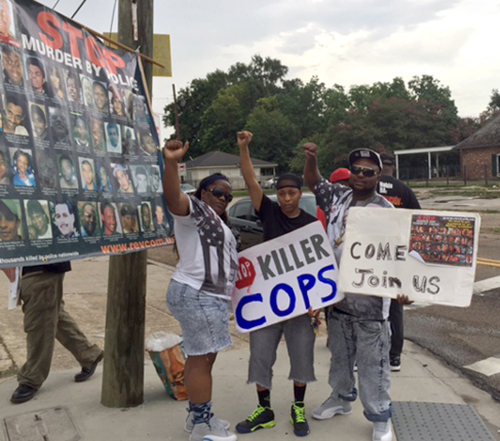
"There’s something bigger than what you see. Protesting, no matter how big it is and where it is, at some point, it stops, because people don’t see things changing. But if someone comes and says, yes, protest, do this, but do these other things. Well, then we’ll know that there is another step, another place to go. ... And at least we know there is a next step, there is something else to do. There’s revolution." Above: People resumed protests against the police murder of Alton Sterling at the Triple S market on July 22. Photo: Special to revcom.us
A: Knowing the way it’s gonna take all kinds of people to make this thing possible—that opened my eyes a lot, ’cause I kind of felt like if people were not willing to be the “first line of defense,” then they were kind of useless. But everybody has a role in the revolution. Everybody has something, some vital part, to play, and it is a huge thing that’s wrong, and there has to be a multipoint attack. In order to break this system down, you’re going to have to attack it in different ways.
It’s like the movie Jurassic Park, when they had the velociraptors there, and they cornered them all, and then they all went in and attacked them and got rid of them. You’re here in Baton Rouge, or in Houston—you have intellectual people over here, or you’re in North Carolina, you have all these people working together. You’re here and here and here... You have a strategy, a whole strategy for bringing them together. I’ve been watching the video. I took it in my room so I could lay in the bed and watch it.
That was interesting to me. I keep telling people to come down to the store (and protest)... and I want them to know, if this lit a fire under me, and you tell somebody else, maybe it’ll light a fire under them. And they can light a fire under somebody else. And maybe the fire for this movement won’t burn out, and turn into an ember going unnoticed because it’s not causing any smoke.
Revolution: Earlier, you spoke of the anger and fear many people have, and how it’s misdirected, and how you think this revolution can really give direction to the anger people have.
A: Yes, with the youth! Our most vital, untapped resource for this revolution! They are young, they are angry, they know that it’s wrong, they have no fear of anything. They’re not afraid of nothing and nobody. But just to have them like that is not going to serve a purpose for the whole movement, the whole revolution. We need to take that anger, take that fury and we can bring it together and harness it like a beam of light. That’s what I mean by focusing it. They have a movement, a revolution behind them, and a purpose, it’ll do some good.
Winning an Actual Revolution
Revolution: At the end BA gets into the possibility of fighting and winning an actual revolution.
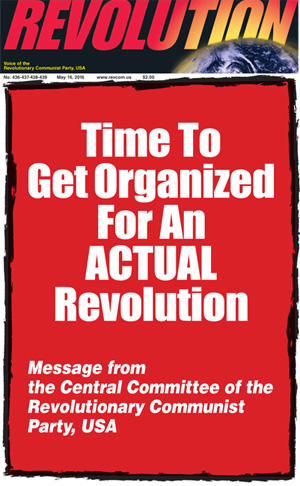
The Revolutionary Communist Party IS ORGANIZING NOW TO OVERTHROW THIS SYSTEM AT THE SOONEST POSSIBLE TIME. Preparing to lead an actual revolution to bring about a radically new and better society: the New Socialist Republic in North America.
A: Yes. To me it’s an actual hope that things can change. Things can get better. When we first started to protest, people would ask me, “Well, what are you all doing, what do y’all want, is it going to make any difference?”
I compared it to a slave that had been a slave for all of his life. Born into slavery, his mother was a slave, his father was a slave—for all intents and purposes, he was not to even know that he was a slave. But he did. Some kind of way, he got enlightened that this wasn’t right. And he heard about something that was in the North, that Black people were free. Nobody had ever come back and said what it was like, and the only thing he knew was, this was wrong.
It wasn’t guaranteed that there even was freedom in the North. He didn’t know for sure. But he took his chance and ran in the middle of the night following a star. Did he know where he was running to? Not necessarily. Did he know what he was running to? No, not necessarily. But one thing that he knew for sure is that where he was and what was going on there wasn’t right. Did a slave that ran away back in the day have any idea that just by running away seeking freedom that we would be as free as we are today? We enjoy some freedoms here, I’m not saying we don’t. But did he have any idea that that would lead to this? No.
We didn’t either. We didn’t have any idea that things here would spark shit all over the fucking world. We just knew that what we were going through wasn’t right. And, to have a plan, to have somebody come in and say look, there’s a plan for this. You don’t have to just run into the darkness, the wilderness, and hope for something better, just by running.
There’s a plan. There’s a pathway. There’s things in place to help guide you. There’s literature, there’s education, there’s DVDs, there’s an outline, a plan to this thing. And it gives you hope, that what you’re doing is for a reason other than the obvious. Not just protesting, but, revolution. Evolution, even. You know?
There’s something bigger than what you see. Protesting, no matter how big it is and where it is, at some point, it stops, because people don’t see things changing. But if someone comes and says, yes, protest, do this, but do these other things. Well, then we’ll know that there is another step, another place to go. Then we say, well, we’ll protest until it’s time to take the next step. And at least we know there is a next step, there is something else to do. There’s revolution.
Revolution: Yes. And we’re getting ready for it.
A: And we’re getting ready for it. What is it, “hasten, while we wait”?
Revolution: Right. Hasten while awaiting the emergence of a revolutionary situation, when millions can be led to go for revolution, all-out, with a real chance to win.
Volunteers Needed... for revcom.us and Revolution
If you like this article, subscribe, donate to and sustain Revolution newspaper.

